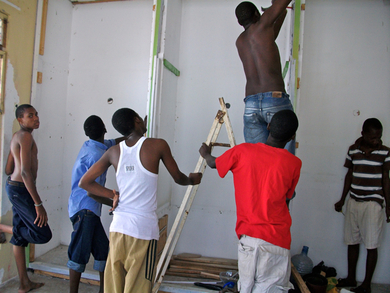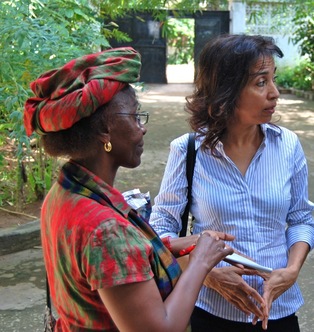
The new facility allows Chipua to greatly expand its operations. The compound includes a main building with a room for the girls’ project and space for the equipment for their vocational training; offices for the staff of the girls’ and Qualifying Test project; offices for non-programme staff; and an office for volunteers.
A separate annex building provides a large classroom space for the Qualifying Test project and a room for the girls’ project to use during their vocational training on batik-making, tie dye and food preparation. A portion of the annex will also be used for storage of materials, freeing up office space in the main building.
When first acquired in June, the new facility was in dire need of repairs and renovation. Chipua staff, including non-programme staff and volunteers, banded together with project participants to overhaul the buildings. Through the winter break in June and July, staff and participants worked with one another to clear rubble and make preparations for extensive renovation.
After reinforcing and preparing the walls of the annex building, a new roof was constructed for the Qualifying Test classroom and girls’ project vocational training area. The roof was made out of locally sourced "makuti" – thatched roof panels made from the fronds of certain palm trees – by local specialists.
With the help of the Executive Director, non-programme staff and volunteers worked to remove old paint and damaged portions of the walls inside the main building, repair the damaged areas with plaster and then prepare the walls for painting. Project participants joined them in painting the interior of the main building; cleaning the floors; and moving furniture and office equipment into the appropriate offices.
Professional carpenters, plumbers and electricians were called in to assist with repairing window frames and the plumbing and electrical systems; installing new lights, fans and windows; expanding the electrical system to the annex building; and constructing new restroom facilities for the use of project participants. Boys from the Qualifying Test project were encouraged to assist the professional craftsmen and volunteers in their work in order to learn some of the skills being used in making the repairs and renovations.
Participants from the Qualifying Test project were able to move into their new classroom in July but the facility itself officially opened with the completion of the renovations on the main building and the resumption of the girls’ project at the beginning of August.
Earlier in the winter, Chipua also concluded negotiations to purchase a plot of land in Dar es Salaam's Mbagala suburb. The land was purchased in anticipation of implementing the organisation's long-term strategic plans, which call for the expansion of programmes into the outer suburbs of the city.
Some of the most disadvantaged participants come from Dar es Salaam's outer suburbs, pushed into the area by high real estate costs nearer to the city centre. Because they are unable to afford transport to Chipua's new Block 41/Biafra training centre in Kinondoni, the long-term strategic plan highlights the need to build training facilities in the outer suburbs where they are most needed.
The Mbagala location will focus primarily on replicating Chipua's successful girls' projects in the outer suburbs. The facility will also be home to a new pilot project for boys, which will use curriculum similar to that used in the girls' project. The boys will receive instruction on character development; life skills, such as health information and leadership skills; gender equality; and vocational skills, including carpentry, plumbing and electrical repair.
The $20,000 facility will feature office space, dormitories for participants, workspace for vocational training and classrooms for traditional instruction.





 RSS Feed
RSS Feed